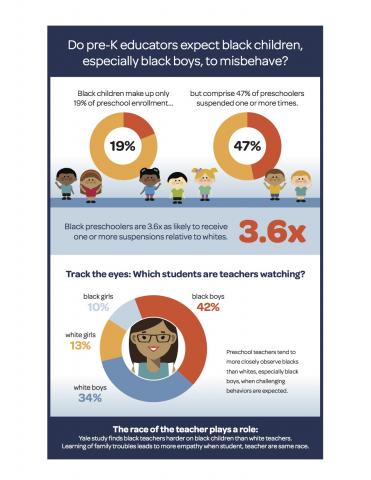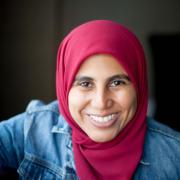
Yale Study on Implicit Bias in Early Ed
My son was 3 years old when I was accepted into my Masters program. As soon as I received my acceptance letter, I started looking for preschool programs for him. I knew very little about what to look for in a program. He was my first child and it would be the first time he would be in a full-time preschool program. My university was half an hour from our home, so we were fortunate to find him in a spot in a program that was close to my lecture halls. The program focused on social and emotional development, but at that time, I didn’t know much about what this meant. In fact, most of what I know about a social and emotional curriculum I learned through watching my son’s class. I saw that the teachers spent time on understanding my son and making sure that he was heard. They worked on ensuring the whole class developed healthy relationships- they were taught how to negotiate conflict effectively, how to problem solve, how to manage their feelings - all as they learned through play. We loved the program so much; my son stayed there through kindergarten, where the program ended.
I didn't realize how truly fortunate we were to have found this program, until my son went to first grade in our local elementary school. One of the first experiences he had in his new school transformed how he understood discipline and the role of the teachers in his classroom. On his second day of school he came to tell me about a video they watched in class, to warn them he said, of how they could get in trouble and end up in jail. He was 6 at the time and his most pressing issue up until that point had been reconciling how Peter Parker turned into Spider-Man and trying to find out why the dinosaurs he loved so much had become extinct.
I was born in Kenya and my husband is Puerto-Rican. My son was and is proud of his rich cultural heritage as a young Black, Latino man. At that point, I had not yet spoken to him of the complicated issues he would have to negotiate around race. We have a saying in Kenya- what you're not taught by your mother, you're taught by the world. He started noticing one stark difference from his preschool class, how children, particularly Black children were disciplined. He sat with me one day after school and explained to me he was Black. Before I had a chance to respond, he said, “but mommy, I'm the only Black boy who got to got to recess today.” I was wholly unprepared for the discussion, because like many mothers, I didn't realize that racial disparities in discipline started at such a young age.
My son’s class was not unique. A new study from the Yale Child Studies Center examined implicit bias in preschool teachers. The study found that teachers are more likely to expect Black children to misbehave, particularly Black boys. The study's lead researcher, Dr. Gilliam, said of his findings, “Implicit biases do not begin with Black men and police. They begin with Black preschoolers and their teachers, if not earlier. Implicit bias is like the wind: You can’t see it, but you can sure see its effects.”
It is not surprising then that Black children, particularly Black boys are subjected to higher rates of puntive discipline, leading to higher rates of expulsions and suspensions. Studies have shown that while Black boys make up just 18% of the preschool population, they account for 48% of all preschool suspensions. In fact, Black and Latino boys combined account for 66% of all pre-school suspensions.
Beyond the immediate complications faced by parents as a consequence of suspensions and expulsions- such as needing to miss work and paying added expenses while finding alternate care- there are many serious and far-reaching consequences to these students. Young students who are expelled or suspended are 10 times more likely to drop out of high school and face incarceration than those who are not. This is known as the school to prison pipeline.
The ACLU defines the school to prison pipeline as follows: “The ‘school-to-prison pipeline’ refers to the policies and practices that push our nation's schoolchildren, especially our most at-risk children, out of classrooms and into the juvenile and criminal justice systems. This pipeline reflects the prioritization of incarceration over education.” With preschool expulsions and suspensions, the first rung on the school to prison pipeline can start as early as pre-school.
My son’s preschool that had focused on social and emotional development helped cultivate the skills he will need to graduate high school and attend college. A Robert Wood Johnson Foundation study found that social emotional development skills could “determine whether a child goes to college or prison, and whether they end up employed or addicted.”
While my son is off to a good start, so many other boys of color aren’t as fortunate. Many Black and Latino children enter pre-school with existing socio-economic challenges, they are then further burdened by unequal access to the kind of education they need to succeed. When Black and Latino children, particularly boys, are subjected to implicit bias, they are shut off from accessing the social and emotional tools they need to graduate high school and attend college. An unequal start leads to perpetual unequal outcomes that too many young men of color will struggle to overcome.
Studies, such the ones conducted by Dr Gilliam at Yale, have raised awareness with educators and policy makers to the work that must be done in order for all our children to thrive. We need policies that support teachers through training and professional development that helps them understand and challenge implicit biases, specifically in early childhood settings.
I am fortunate to be part of team at MomRising that is working to build coalitions to support this growing sea of change in our nation's early childhood programs. It is my hope that you will join our work to address pre-school expulsions and suspensions, to ensure all our children have equal access to the tools they need to thrive.
For more information on our work, please visit our KidsRising Facebook page:



The views and opinions expressed in this post are those of the author(s) and do not necessarily reflect those of MomsRising.org.
MomsRising.org strongly encourages our readers to post comments in response to blog posts. We value diversity of opinions and perspectives. Our goals for this space are to be educational, thought-provoking, and respectful. So we actively moderate comments and we reserve the right to edit or remove comments that undermine these goals. Thanks!